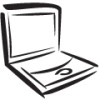Gateway M500 Gateway M500 Notebook User's Guide - Page 104
Regulatory compliance, statements, Wireless Guidance
 |
View all Gateway M500 manuals
Add to My Manuals
Save this manual to your list of manuals |
Page 104 highlights
Appendix B: Safety, Regulatory, and Legal Information Regulatory compliance statements Wireless Guidance Low power, Radio transmitting type devices (radio frequency (RF) wireless communication devices), may be present (embedded) in your notebook system. These devices may operate in the 2.4 GHz (i.e. 802.11B/G LAN & Bluetooth) , 5.2 GHz (i.e. 802.11A LAN), and traditional cellular or PCS cellular bands (i.e. Cellular data modem). The following section is a general overview of considerations while operating a wireless device. Additional limitations, cautions, and concerns for specific countries are listed in the specific country sections (or country group sections). The wireless devices in your system are only qualified for use in the countries identified by the Radio Approval Marks on the system rating label. If the country you will be using the wireless device in, is not listed, please contact your local Radio Approval agency for requirements. Wireless devices are closely regulated and use may not be allowed. The power output of the wireless device or devices that may be embedded in your notebook is well below the RF exposure limits as known at this time. Because the wireless devices (which may be embedded into your notebook) emit less energy than is allowed in radio frequency safety standards and recommendations, Gateway believes these devices are safe for use. Regardless of the power levels, care should be taken to minimize human contact during normal operation. This equipment complies with FCC radiation exposure limits set forth for an uncontrolled environment of a portable device. This transmitter must not be co-located or operating in conjunction with any other antenna or transmitter. The wireless devices installed in this system are intended to be used indoors. In some areas, use of these devices outdoors is prohibited. Some circumstances require restrictions on wireless devices. Examples of common restrictions are listed below: Warning Radio frequency wireless communication can interfere with equipment on commercial aircraft. Current aviation regulations require wireless devices to be turned off while traveling in an airplane. 802.11B (also known as wireless Ethernet or Wifi) and Bluetooth communication devices are examples of devices that provide wireless communication. 98 www.gateway.com















